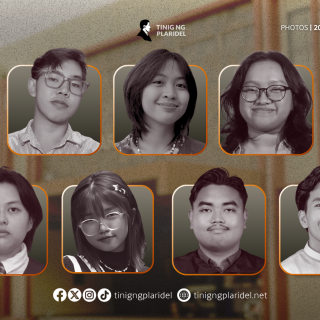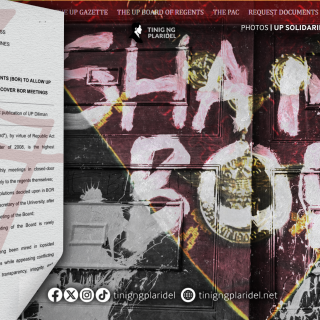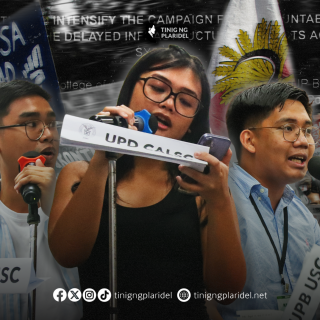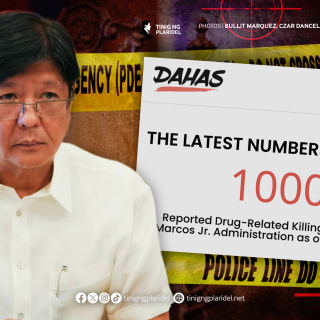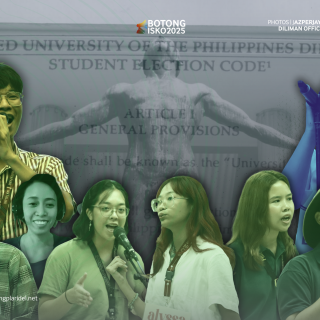As the 2025 polls approach, the lack of a legal basis for classifying premature campaigning as an election offense continues to hinder the Commission on Elections (Comelec) from penalizing candidates who engage in such practice.
In a media forum held last Oct. 21, 2024, at the University of the Philippines Diliman, Comelec Chairperson Atty. George Erwin Garcia, Kontra Daya Convenor Danilo Arao, and Legal Network for Truthful Elections (LENTE) Senior Program Director Atty. Ryan Jay Roset discussed the scope and situation of premature campaigning in the Philippines.

Guest speakers Comelec Chairperson Atty. George Erwin Garcia, Kontra Daya Convenor Danilo Arao, and Legal Network for Truthful Elections (LENTE) Senior Program Director Atty. Ryan Jay Roset discuss the 2025 midterm elections in the Diliman Media Forum. Photo by Richardson Tubo
Some politicians and contenders in the 2025 midterm elections have already appeared on various programs and platforms even before the designated campaign period which shall only begin 90 days and 45 days before the national and local polls, respectively.
Such acts constitute premature campaigning, according to election watchdogs. However, an amendment to the Republic Act (RA) 8436, or the Election Automation Law of 2007, reads that election offenses “applicable to a candidate shall effect only upon the start of the aforesaid campaign period.”
This means no candidate may be held liable for any offenses prior to the campaign period.
In 2009, the Supreme Court ruled in the landmark Penera vs. Comelec case that an individual who submits a certificate of candidacy (COC) is not officially considered a “candidate” until the commencement of the official campaign period.
The high court initially disqualified Penera for leading a motorcade a day before the official campaign, but later reversed its decision as Penera was not yet a candidate at that time.
Subsequently, the law began to only acknowledge people who filed their candidacies as candidates when the campaign period started, thus, no person may be held accountable for premature campaigning.
Senators Miriam Defensor Santiago and Leila de Lima previously filed bills seeking to prohibit premature campaigning. However, the bills stalled in Congress.
‘Lacking’ legal basis
Following the SC’s decision, many aspirants have taken advantage of this legal loophole—mobilizing their financial resources months before the start of the election season to promote themselves.
Elective aspirants have even become more persistent in penetrating social media platforms, especially Facebook, the Philippines’ most-used platform. Meta reported that 318, 825 boosted Facebook posts from Aug. 2020 to Nov. 2024 related to social issues, elections, and politics amounted to P8 billion.
Among the top spenders on Facebook are senatorial aspirants Camille Villar, Wilbert Lee, Rodante Marcoleta, and incumbent Senators Bong Go and Francis Tolentino, according to the Philippine Center for Investigative Journalism.
A Bulatlat report also revealed that Facebook page Pilipinas Today spent a total of P17.19 million on advertisements of a few notable national and local aspiring candidates, including Makati Mayor Abby Binay, Senator Francis Tolentino, House Speaker Martin Romualdez and self-confessed drug lord Kerwin Espinosa.
 Infographic summarizing data from Meta Advertisement Library Report. Published by Bulatlat
Infographic summarizing data from Meta Advertisement Library Report. Published by Bulatlat
Last April, Garcia announced that the poll body will already immediately presume individuals who filed to seek public office in the 2025 polls as candidates. Hence, rules on premature campaigning will already be applied even to those who are not yet considered official candidates in the midterm elections.
However, Garcia said that Comelec is incapable of penalizing and possibly disqualifying offenders of premature campaigning as they “lack” authority to enact rules despite being in charge of all elections in the Philippines.
“We [Comelec] cannot punish yet, we cannot control [election conditions] yet, we cannot place any part of the country under Comelec’s control,” Garcia said.
He said that the SC, however, has the power to reexamine the current law and reverse it accordingly.
Arao, meanwhile, suggested utilizing the extralegal powers of “public hearings” as a platform to question while being harmless.
“[Ka]pag naglabas na kami ng aming findings na ito [candidates] ‘yung mga part ng political dynasty, big business etc., why not call for a public hearing? Confront them in the presence of the media [and] ask them these questions […] [Ngunit] iba pa rin yung dating ‘pag ang nag-public hearing is yung Comelec [mismo],” Arao pressed.
Garcia said the recent Resolution No. 11045, parallel to the current Omnibus Electoral Code promulgating election rules and regulations, was issued in hopes of attracting the public to question the resolution in the SC.
Voters’ Literacy
Garcia emphasized that the public must actively engage in demanding and scrutinizing laws that allow certain aspirants to exploit legal loopholes to their advantage. Understanding various electoral issues is ultimately in the public’s best interest, he said.
“We [Filipinos] must always accept criticism, opposition, comments, because this is how we thrive. Hindi po isa lang ang may control ng kaalaman sa bayan natin ‘pag tungkol sa halalan, lahat tayo may pakialam,” Garcia said.
To increase voters’ literacy, Arao suggested that Comelec can also help in programs driven by a unified cause of preventing disinformation from permeating election discourse. Since 2016, Kontra Daya has taken pride in conducting educational talks and programs all year round.
Arao said these forums are not only limited to discussing the “intricacies and nuances of the Automated Election System (AES)” but extend to analyzing elections, its history, and elements of money politics present in our political system.
Related: tinigngplaridel.net/egasc2024-voters-education/
“Sana magsimula na ‘to sa pag-aaral. Wala kasi ‘tong kapalit kapag tinuturo sa paaralan,” Garcia said emphasizing that the voter’s education program should start at society’s grassroots.



